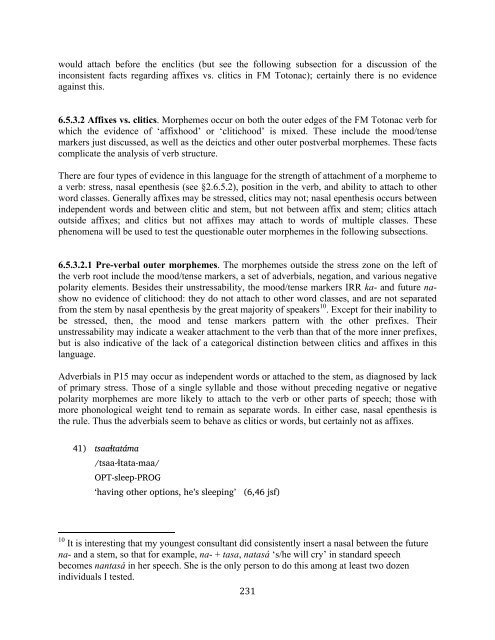The phonology and morphology of Filomeno Mata Totonac
The phonology and morphology of Filomeno Mata Totonac
The phonology and morphology of Filomeno Mata Totonac
Create successful ePaper yourself
Turn your PDF publications into a flip-book with our unique Google optimized e-Paper software.
would attach before the enclitics (but see the following subsection for a discussion <strong>of</strong> the<br />
inconsistent facts regarding affixes vs. clitics in FM <strong>Totonac</strong>); certainly there is no evidence<br />
against this.<br />
6.5.3.2 Affixes vs. clitics. Morphemes occur on both the outer edges <strong>of</strong> the FM <strong>Totonac</strong> verb for<br />
which the evidence <strong>of</strong> ‘affixhood’ or ‘clitichood’ is mixed. <strong>The</strong>se include the mood/tense<br />
markers just discussed, as well as the deictics <strong>and</strong> other outer postverbal morphemes. <strong>The</strong>se facts<br />
complicate the analysis <strong>of</strong> verb structure.<br />
<strong>The</strong>re are four types <strong>of</strong> evidence in this language for the strength <strong>of</strong> attachment <strong>of</strong> a morpheme to<br />
a verb: stress, nasal epenthesis (see §2.6.5.2), position in the verb, <strong>and</strong> ability to attach to other<br />
word classes. Generally affixes may be stressed, clitics may not; nasal epenthesis occurs between<br />
independent words <strong>and</strong> between clitic <strong>and</strong> stem, but not between affix <strong>and</strong> stem; clitics attach<br />
outside affixes; <strong>and</strong> clitics but not affixes may attach to words <strong>of</strong> multiple classes. <strong>The</strong>se<br />
phenomena will be used to test the questionable outer morphemes in the following subsections.<br />
6.5.3.2.1 Pre-verbal outer morphemes. <strong>The</strong> morphemes outside the stress zone on the left <strong>of</strong><br />
the verb root include the mood/tense markers, a set <strong>of</strong> adverbials, negation, <strong>and</strong> various negative<br />
polarity elements. Besides their unstressability, the mood/tense markers IRR ka- <strong>and</strong> future na-<br />
show no evidence <strong>of</strong> clitichood: they do not attach to other word classes, <strong>and</strong> are not separated<br />
from the stem by nasal epenthesis by the great majority <strong>of</strong> speakers 10 . Except for their inability to<br />
be stressed, then, the mood <strong>and</strong> tense markers pattern with the other prefixes. <strong>The</strong>ir<br />
unstressability may indicate a weaker attachment to the verb than that <strong>of</strong> the more inner prefixes,<br />
but is also indicative <strong>of</strong> the lack <strong>of</strong> a categorical distinction between clitics <strong>and</strong> affixes in this<br />
language.<br />
Adverbials in P15 may occur as independent words or attached to the stem, as diagnosed by lack<br />
<strong>of</strong> primary stress. Those <strong>of</strong> a single syllable <strong>and</strong> those without preceding negative or negative<br />
polarity morphemes are more likely to attach to the verb or other parts <strong>of</strong> speech; those with<br />
more phonological weight tend to remain as separate words. In either case, nasal epenthesis is<br />
the rule. Thus the adverbials seem to behave as clitics or words, but certainly not as affixes.<br />
41) tsaa"tatáma<br />
/tsaa-#tata-maa/<br />
OPT-sleep-PROG<br />
‘having other options, he’s sleeping’ (6,46 jsf)<br />
10 It is interesting that my youngest consultant did consistently insert a nasal between the future<br />
na- <strong>and</strong> a stem, so that for example, na- + tasa, natasá ‘s/he will cry’ in st<strong>and</strong>ard speech<br />
becomes nantasá in her speech. She is the only person to do this among at least two dozen<br />
individuals I tested.<br />
! #'"!

















